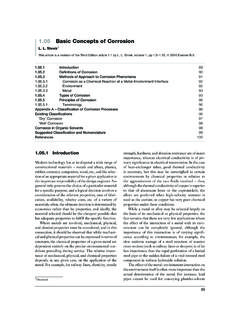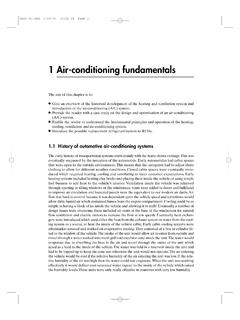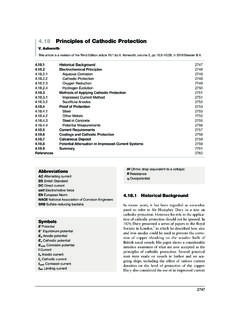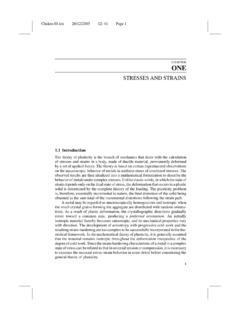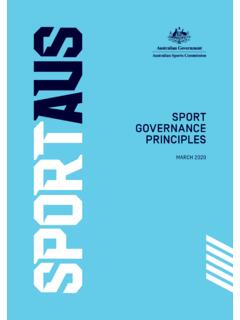Transcription of Sport Management - Elsevier.com
1 CHAPTER 1 Sport ManagementOVERVIEWThis chapter reviews the development of Sport into a major sector ofeconomic and social activity and outlines the importance of Sport manage-ment as a field of study. It discusses the unique nature of Sport and the driversof change that affect how Sport is produced and consumed. A three-sectormodel of public, non-profit and professional Sport is presented, along witha brief description of the salient aspects of the Management context for sportorganizations. The chapter serves as an introduction to the remainingsections of the book, highlighting the importance of each of the completing this chapter the reader should be able to: Describe the unique features of Sport Understand the environment in which Sport organizations operate Describe the three sectors of the Sport industry Explain how Sport Management is different to other fields ofmanagement IS Sport Management ?
2 Sport employs many millions of people around the globe, is played orwatched by the majority of the world s population and, at the elite orprofessional level, has moved from being an amateur pastime to a significantindustry. The growth and professionalization of Sport has driven changes inthe consumption, production and Management of sporting events andorganizations at all levels of Sport organizations at the start of the 21st century involves theapplication of techniques and strategies evident in the majority of modernbusiness, government and non-profit organizations. Sport managers engage3in strategic planning, manage large numbers of human resources, deal withbroadcasting contracts worth billions of dollars, manage the welfare of eliteathletes who sometimes earn 100 times the average working wage and workwithin highly integrated global networks of international sports federations,national Sport organizations, government agencies, media corporations,sponsors and community of Sport Management therefore need to develop an under-standing of the special features of Sport and its allied industries, the envi-ronment in which Sport organizations operate and the types of sportorganizations that operate in the public, non-profit and professional sectorsof the Sport industry.
3 The remainder of the chapter is devoted to a discussionof these points and highlights the unique aspects of Sport FEATURES OF sports tewart and Smith (1999) provide a list of ten unique features of Sport whichcan assist us to understand why the Management of Sport organizationsrequires the application of specific Management techniques. A unique featureof Sport is the phenomenon of people developing irrational passions forsporting teams, competitions or athletes. Sport has a symbolic significance inrelation to performance outcomes, success and celebrating achievement thatdoes not occur in other areas of economic and social activity. Sport managersmust learn to harness these passions by appealing to people s desire to buytickets for events, become a member of a club, donate time to help runa voluntary association or purchase sporting merchandise.
4 They must alsolearn to apply clear business logic and Management techniques to themaintenance of traditions and connections to the nostalgic aspects of sportconsumption and are also marked differences between Sport organizations and otherbusinesses in how they evaluate performance. Private or publicly listedcompanies exist to make profits and increase wealth of shareholders orowners, whereas in Sport , other imperatives such as winning premierships,providing services to stakeholders and members, or meeting communityservice obligations may take precedence over financial outcomes. Sportmanagers need to be cognizant of these multiple organizational outcomeswhile, at the same time, being responsible financial balance is also a unique feature of the interdependent natureof relationships between sporting organizations that compete on the field butcooperate off the field to ensure the long-term viability of both clubs and theirCHAPTER 1: Sport Management4league.
5 In most business environments, the aim is to secure the largest marketshare, defeat all competitors and secure a monopoly. In Sport , clubs and teamsneed the opposition to remain in business, so they must cooperate to sharerevenues and playing talent and regulate themselves to ensure the uncertaintyin the outcome of games between them, so that fans interest will be main-tained. In some ways, such behaviour could be construed as Sport product, when it takes the form of a game or contest, is also ofvariable quality. While game outcomes are generally uncertain, one teammight dominate, which will diminish the attractiveness of the game. Theperception of those watching the game might be that the quality has alsodiminished as a result, particularly if it is your team that loses!
6 The variablequality of Sport therefore makes it hard to guarantee quality in the market-place relative to providers of other consumer also enjoys a high degree of product or brand loyalty, with fansunlikely to switch sporting codes because of a poor match result or thestandard of officiating. Consumers of household products have a huge rangeto choose from and will readily switch brands for reasons of price or quality,whereas sporting competitions are hard to substitute. This advantage is alsoa negative, as sporting codes that wish to expand market share find it difficultto attract new fans from other codes due to their familiarity with the customsand traditions of their existing Sport engenders unique behaviours in people, such as emulating theirsporting heroes in play, wearing the uniform of their favourite player orpurchasing the products that celebrity sports people endorse.
7 This vicariousidentification with the skills, abilities and lifestyles of sports people can beused by Sport managers and allied industries to influence the purchasingdecisions of individuals who follow fans also exhibit a high degree of optimism, at times insisting thattheir team, despite a string of bad losses, is only a week, game or lucky breakaway from winning the next championship. It could also be argued that theowners or managers of Sport franchises exhibit a high degree of optimism bytouting their star recruits or new coach as the path to delivering them on organizations, argue Stewart and Smith (1999), are relativelyreluctant to adopt new technologies unless they are related to sports science,where on-field performance improvements are possible.
8 In this regard, sportorganizations can be considered conservative and tied to traditions andbehaviours more than other final unique aspect of Sport is its limited availability. In other indus-tries, organizations can increase production to meet demand but, in Sport ,clubs are limited by season length and the number of scheduled games. ThisUnique Features of Sport5constrains their ability to maximize revenue through ticket sales and associ-ated income. The implication for Sport managers is that they must understandthe nature of their business, the level of demand for their product and services(whatever form that may take) and the appropriate time to deliver Management ENVIRONMENTG lobalization has been a major force in driving change in the ways Sport isproduced and consumed.
9 The enhanced integration of the world s economieshas enabled communication to occur between producers and consumers atgreater speed and variety and Sport has been one sector to reap the of elite Sport events and competitions such as the OlympicGames, World Cups for rugby, cricket and football, English Premier LeagueFootball, the National Basketball Association (NBA) and Grand Slam tour-naments for tennis and golf enjoy unprecedented coverage. Aside fromactually attending the events live at a stadium, fans can view these eventsthrough free to air and pay or cable television; listen to them on radio and theInternet; read about game analyses, their favourite players and teamsthrough newspapers and magazines; receive progress scores, commentary orvision on their mobile phones; and sign up for special deals and informationthrough online subscriptions using their e-mail address.
10 The global sportmarketplace has become very crowded and Sport managers seeking to carveout a niche need to understand the global environment in which they mustoperate. Thus, one of the themes of this book is the impact of globalizationon the ways Sport is produced, consumed and governments view Sport as a vehicle for nationalism, economicdevelopment or social development. As such, they see it as within theirpurview to enact policies and legislation to support, control or regulate theactivities of Sport organizations. Most governments support elite traininginstitutes to assist in developing athletes for national and internationalcompetition, provide funding to national sporting organizations, supportsport organizations to bid for major events and facilitate the building of majorstadiums.



